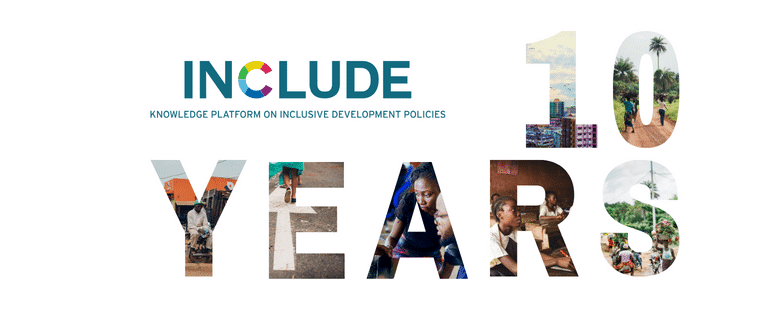
By Anika Altaf
As the year is ending, so comes the time to reflect. This year especially since it is our 10 years anniversary, making it the perfect to celebrate the great work done, but also to learn. And what better way to learn than to reflect on what we have been doing and to take stock?
Why INCLUDE?
INCLUDE, the knowledge platform for inclusive development policies, was initiated in 2012 by the Netherlands Ministry of Foreign Affairs to bridge the gap between (academic) knowledge and policy in the field of Inclusive Development (ID) in Africa. The focus on ID was and still is an important one, as many people in Africa do not reap the benefits of economic progress and are socially, politically or otherwise excluded. For INCLUDE reducing poverty and inequality in both monetary and non-monetary dimensions is at the core of inclusive development. We look at outcomes and, more importantly, at the distribution of outcomes and always ask ourselves who gets what, when, where and why. We also look at the processes underlying the design and implementation of development interventions.
The African voice
From the very beginning our African members have been crucial in developing our knowledge agenda and ensuring that the African perspective is the starting point and core of our work. Our African members have also been the ones to point out the importance of policy implementation and who benefits or doesn’t benefit from that. This for example became visible during COVID times, when certain African countries implemented policies to waive electricity bills. However, people in poverty often did not have access to electricity in the first place. Through our work, we tried to make the barriers that people face to benefit from policy visible for policymakers, both in Africa and for Dutch development actors.
What we have done
In the past 10 years we have worked on many different topics in several African countries and with many partners. We did this through three types of activities: research, knowledge sharing and policy dialogues. Early on we started with topics such as youth employment, youth engagement, social protection and more recently we added equity in COVID-19 policies, digitalization of basic services, green jobs and green economy transition. Through our work, in the past ten years we have managed to contribute to several policy processes both in the Netherlands, e.g. on social protection, and in Africa through our African Policy Dialogues, for example on homeschooling in Kenya and labour externalization in Uganda.
What we have learnt
So what have these 10 years brought us in terms of learning? A few incredibly valuable insights, namely:
- Having policies and interventions aimed at inclusion of certain groups does not automatically lead to inclusion of people, it is the implementation that matters greatly.
- Even today there is still policy thinking that assumes a trickle down effect of benefits, when in fact we know this does not work. Redistribution is a much better route to inclusive development.
- It is thus important to continue to deconstruct myths and provide evidence so we know what we are talking about.
- Realizing that investing in a certain group or geographical area may create new inequalities for other groups or areas. It is important to at the very least be aware of this and to seek possible ways to balance this.
- Therefore, we need to ask the right questions to uncover barriers to access and we need to ask those questions to people who experience the barriers. That way we can connect the realities of every day lives of people to policy formulation and have a better shot at reaching our overarching and shared goals, to reduce poverty and inequality.
At INCLUDE we look forward to continue asking the right questions, gathering the right evidence and bringing the right people together.